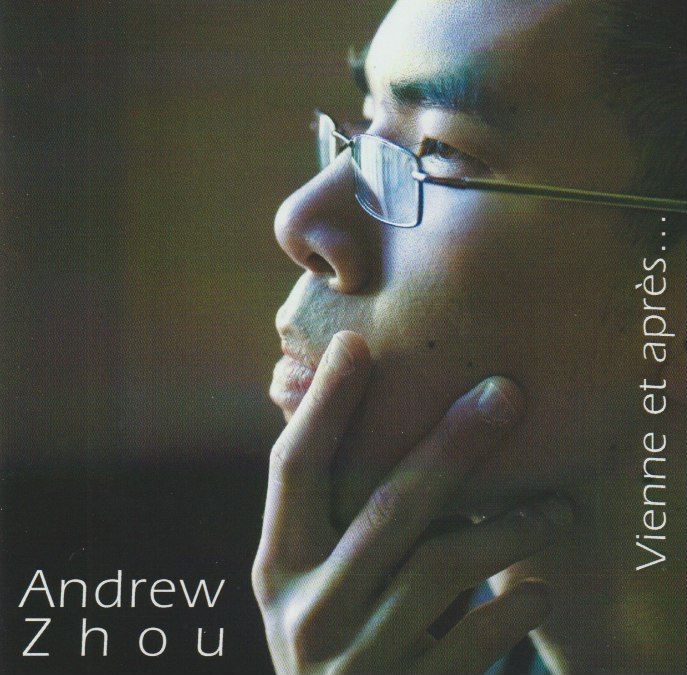Vienne et après ... Pianist Andrew Zhou and the music of today

Pianist Andrew Zhou is a laureate of the 2012 Orléans Competition for Contemporary Music, where he was a finalist. This disc, Vienne et après, presents music by Pintscher, Stockhausen, Lachenman, Schoenberg and Walter Zimmermann: core repertoire for that competition, of course! I is part of a project co-cuated by Zhou and Christopher Guzman investigation g the course of German and Austrian music written since the time of Schoenberg. Stockhausen, for example, began as heavily influenced by Schoenberg before freeing himself towards more otherworldly directions.
I have included alternative performances for several pieces during the course of this post; you can compare them with Zhou's own performances in the Soundcloud panel at the bottom.
Matthias Pintscher's On a clear day (2004), for Mitsuko Uchida, is a piece of “imaginary theatre” of the utmost beauty (the marking is “evenly floating and swaying“). In the absence of a YouTube performance by Zhou, here's one to sample by Alfonso Alberti:
... it is fascinating how Stockhausen's Klavierstück XIV (1984) comes out of this naturally. One of the shorter pieces of the cycle (seven minutes), Composed for Pierre Boulez' 60th birthday. it is linked with the Montag day of Licht (the third day of the seven). It is subtitled "Geburtstag-Formel" (Birthday Formula) and you hear the pianist speaking the phonemes of Licht's "Super-formula"). Zhou's performance shows real understanding of Stockhausen's language. Again, in the absence of Zhou's performance, here's an alternative that includes score (and, in the YouTube comments, a fuller explanation of the piece):
Inspired by Anish Kapoor's 2002/3 installation at the Tate Modern in London, Olga Neuwirth’s Marsyas plays with the contrast between the chaotic satyr Marsyas and the more measured Apollo (not to be confused with Thomas Larcher's piano piece of this name, incidentally). It is a magnificnet piece, sometimes outrageous in its demands, sometimes pulsing, often (always?) beautiful. Here's an alternative performance by Christopher Park for you to compare once you have Zhou's disc: I find Zhou the more musical player, though:
Helmut Lachenmann's Echo Andante is an early work (1961/2), compsoed just after the composer had spend two years in Venice with Luigi Nono. It functions as a sort of "deconstruction of gesture": sound events appear in isolation, with silence a seperator. Here’s a performance from Darmstadt to compare with Zhou's:
In amongst all this objectivity in Lachenman's piece comes surprising beauty. A scuplted, sometimes granitic beauty perhaps, but beauty all the same.
For the Orléans Competition, Schoenberg almost classifies as Early Music. In the finals this year, the young Japanese pianist Chisato Taniguchi gave a performance of Schoenberg's Suite, Op. 25 (1923). You can hear it in this video (starting about 3 hours 25 minutes in - the video presents the whole, long, final):
Andrew Zhou opts for the Fünf Klavierstücke, Op 23 (Five Piano Pieces) performances of strength and grace - and some playfulness! Here we can insert a “Brucie bonus” without parallel: Maurizio Pollini in 1974, live, playing Schoenberg's Opp. 11, 19, 23, 25, 33a, 33b. Op. 23 starts at 18"12:
Zhou has something of Pollini's objectivity, but with a heightened sense of play. This is wonderful Schoenberg and, if it were a better known performance, would surely win many advocates for Schoenberg's piano output.
Walter Zimmermann's Wüstenwanderung is a result of the "New Simplicity" movement, an aesthetic reaction to the fierce complexities of Stockhausen, Boulez et al. Zimmermann's 1986 piece has a huge remit: to investigate the ultimate destination of humankind, taking in Plato, Nietzsche, Ezra Pound and Augustus Silesius. Here's an alternative performance by Hermann Kretzschmar:
(and here's a full listing for that Mode disc).
And as an extra bonus, the pianists's own Con Variazioni is Andrew Zhou's response to the Beethoven celebrations and 2020:
This essay by Zhou on his own piece is illuminating.
You can hear Zhou's Vienne et après disc complete on Soundcloud below:
... and here's a link to the album page.
